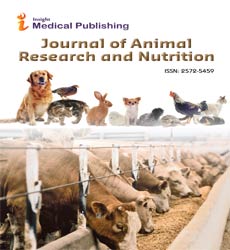Abstract
Amending Reduced Fish Meal Feeds with Phospholipids to Improve Performance of Hybrid Striped Bass
Objective: In carnivorous fishes like hybrid striped bass Morone chrysops female x M. saxatilis male, sparing dietary fish meal with soybean meal may lead to reduced feed intake and growth performance. Dietary phospholipid supplements may help improve feed intake and growth by increasing palatability. The present study was designed to test the effects of dietary supplementation with marine- or soy-origin lecithins (sources of phospholipids) on the growth performance of hybrid striped bass fed reduced fish meal, soybean meal-based feeds. Methods: We evaluated the growth performance of hybrid striped bass fed diets containing 30% fish meal or 10% fish meal/65% soybean meal with and without supplementation of soy- or marine-origin lecithin at 2 or 4% of the diet. Juvenile fish (33 ± 0.6 g, mean ± SEM) were stocked in a recirculation aquaculture system (8 fish per tank), and diets were randomly assigned to tanks in quadruplicate (n=4). Fish were fed assigned diets daily to apparent satiation for 9 weeks, after which standard metrics of growth performance were assessed. Results: Growth performance was generally superior among fish fed the lecithinsupplemented diets. This effect was particularly evident among fish fed the 10% fish meal diet supplemented with 2 or 4% marine lecithin, which exhibited significantly greater feed intake, weight gain, and specific growth rate than those fed the 10% fish meal or 30% fish meal feed. Feed conversion ratio was not statistically different among the dietary treatments. Conclusion: Our results suggest amending reduced fish meal feeds with phospholipids can improve feed intake and growth in hybrid striped bass, and supplementing the diet with marine lecithin in particular may increase hybrid striped bass growth beyond that typically achieved with fish meal-based formulations.
Author(s):
Heidi Hill A,Jesse Trushenski T,Brian Gause R,Jerome Laporte
Abstract | Full-Text | PDF
Share this

Google scholar citation report
Citations : 764
Journal of Animal Research and Nutrition received 764 citations as per google scholar report
Abstracted/Indexed in
- Google Scholar
- China National Knowledge Infrastructure (CNKI)
- WorldCat
- International Committee of Medical Journal Editors (ICMJE)
- Secret Search Engine Labs
Open Access Journals
- Aquaculture & Veterinary Science
- Chemistry & Chemical Sciences
- Clinical Sciences
- Engineering
- General Science
- Genetics & Molecular Biology
- Health Care & Nursing
- Immunology & Microbiology
- Materials Science
- Mathematics & Physics
- Medical Sciences
- Neurology & Psychiatry
- Oncology & Cancer Science
- Pharmaceutical Sciences

